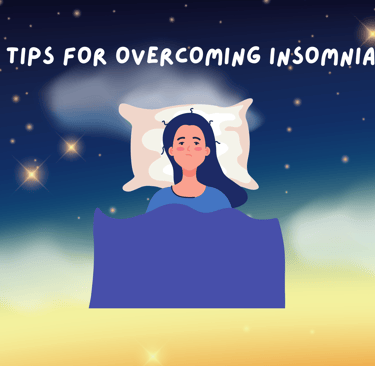Better Sleep Tips for Menopause
HEALTH TIPS
11/26/20232 min read


Menopause is a significant phase in a woman's life, bringing about various changes that can affect daily living, including sleep patterns. Many women experience sleep disturbances during this period due to symptoms like hot flashes, night sweats, and hormonal fluctuations. However, with the right strategies, you can improve your sleep quality and enjoy a more restful night. Here are some effective tips for better sleep during menopause:
Keep a Cool Bedroom
Hot flashes and night sweats are common during menopause, making it challenging to sleep through the night. One of the best ways to counteract this is by keeping your bedroom cool. Lower the thermostat, use a fan, and consider breathable, moisture-wicking bed linens. A cooler environment can significantly improve your comfort and sleep quality.
Establish a Regular Sleep Schedule
Your body thrives on routine, especially when it comes to sleep. Try to go to bed and wake up at the same time every day, including weekends. This consistency reinforces your body's natural sleep-wake cycle and can help regulate sleep patterns disrupted by menopause.
Limit Caffeine and Alcohol
While a cup of coffee or a glass of wine might seem harmless, they can significantly impact your sleep, especially during menopause. Caffeine and alcohol can both disrupt sleep patterns and exacerbate menopausal symptoms like hot flashes. Try to limit these beverages, particularly in the hours leading up to bedtime.
Create a Relaxing Bedtime Routine
Establish a calming bedtime ritual to signal to your body that it's time to wind down. This might include activities like reading, taking a warm bath, practicing gentle yoga, or listening to soothing music. These activities can help relax your mind and body, making it easier to fall asleep.
Consider Your Bedroom Environment
Your bedroom should be a sanctuary for sleep. Invest in comfortable bedding, use dark curtains to block out light, and ensure the room is quiet. You might also want to consider white noise machines or earplugs if you're sensitive to sounds.
Stay Active During the Day
Regular physical activity can significantly improve sleep quality. It helps to regulate your mood, decrease stress, and tire you out in a good way. However, try to avoid vigorous exercise close to bedtime, as it can have the opposite effect, making it harder to fall asleep.
Mindful Eating Before Bed
Eating heavy or large meals before bedtime can lead to discomfort and disrupt your sleep. If you're hungry, opt for a light snack that won't upset your stomach. Foods like bananas, almonds, or a small bowl of whole-grain cereal can be good choices.
Manage Stress
Menopause can be a stressful time, and stress is a common culprit behind sleep problems. Techniques such as deep breathing, meditation, progressive muscle relaxation, or even keeping a journal can help manage stress levels and improve your sleep.
Seek Professional Advice
If sleep disturbances persist despite trying these strategies, it might be time to talk to a healthcare provider. They can offer advice tailored to your individual needs, which may include treatments like hormone therapy or other medical interventions.
Menopause is a natural part of aging, but it doesn't have to mean poor sleep. By adopting these strategies, you can tackle menopause-related sleep disturbances and enjoy better rest. Remember, every woman's experience with menopause is unique, so what works for one person might not work for another. It's important to find what works best for you and to seek professional advice when needed.
